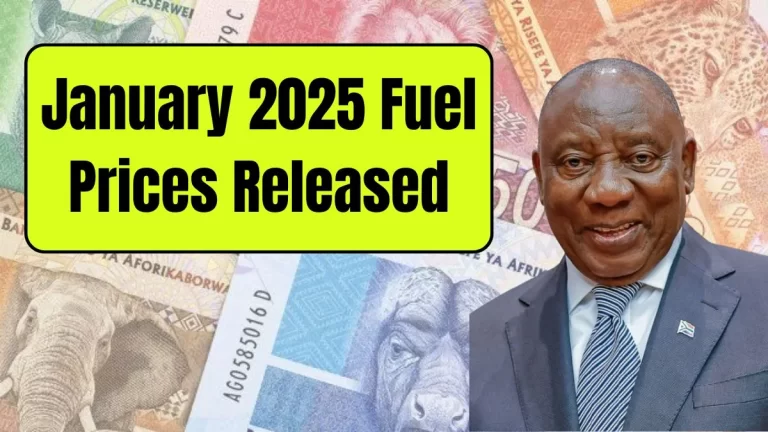To all South Africans! It’s that time again when we talk about something that affects all of our wallets – fuel prices. The January 2025 fuel price hike is here, and I know we’re all feeling a bit nervous about what this means for our daily lives and bank accounts.
Let’s face it, our economy is already under pressure, and now we have to deal with higher fuel costs too. It’s not just about filling up our cars anymore; this increase is going to touch every part of our lives, from the food we buy to the buses we take. But don’t worry, we’re in this together, and I’m here to break it all down for you.
Details of the January 2025 Fuel Price Hike
Alright, let’s look at the numbers. Brace yourselves, because here’s what we’re dealing with:
- Petrol 93 is up by 19 cents per litre
- Petrol 95 increased by 12 cents per litre
- Diesel 0.05% rose by 7.50 cents per litre
- Diesel 0.005% jumped by 10.50 cents per litre
I know, I know – it’s not the news we wanted to hear. But here’s the thing: these increases are linked to the price of Brent Crude oil, which is sitting at around $90 per barrel. That’s pretty high, and unfortunately, it’s out of our control.
Global Factors Influencing Fuel Prices
Now, you might be wondering, “Why are oil prices so high?” Well, it’s like a big, complicated puzzle. There’s trouble brewing in some of the places where oil comes from, and that makes everyone nervous. When people get nervous about oil, prices go up.
Then we’ve got OPEC (that’s the Organization of the Petroleum Exporting Countries) and Russia deciding to produce less oil. Less oil means higher prices – it’s that supply and demand thing we learned about in school.
The whole world is using oil in different ways too. Some countries are using more, some less, and this back-and-forth makes oil prices jump around like a yo-yo.
Local Factors Driving Price Hikes
Here’s the kicker for us South Africans – we don’t produce our oil. We have to buy it from other countries, and when the price goes up out there, we feel it right here at home. It’s like when the exchange rate goes crazy, and suddenly everything imported costs more. Same deal with fuel.
Impact on South African Households
So, what does this mean for us? Well, if you own a car, you’re going to be paying more at the pump. But even if you don’t, you’re not off the hook. Bus and taxi fares are likely to go up too.
“I’m worried about how I’ll manage my daily commute now. It’s already expensive, and this increase will really stretch my budget.” – Sarah, office worker from Johannesburg
It’s especially tough for families who are already struggling to make ends meet. Every extra rand spent on transport is a rand not spent on other essentials.
Effects on Businesses and Consumer Goods
It’s not just about getting to work, though. Think about all the trucks delivering food to our supermarkets or goods to our shops. They all need fuel, and when their costs go up, so do the prices of the things we buy.
I was chatting with my local greengrocer the other day, and he’s concerned about how he’ll keep his prices down with delivery costs going up. It’s a domino effect that touches everything from our bread to our bananas.
Adjustments in Household Habits
We’re a resilient bunch, though, aren’t we? I’ve noticed people in my neighborhood starting to carpool more. Some folks are dusting off their bicycles for shorter trips. We’re adapting, finding ways to cut down on fuel use where we can.
Maybe this is a chance for us to rethink how we move around. Could you walk to the corner shop instead of driving? Or maybe plan your errands so you do them all in one trip? Every little bit helps.
Public Response and Expectations from the Government
There’s a lot of talk about what the government should do. People are calling for lower fuel levies and even for some taxes to be put on hold. I get it – we’re looking for relief wherever we can.
But here’s the thing: the government needs money too, for roads and other big projects. It’s a tough balance, and there’s no easy answer. We’re all hoping for some middle ground to help ease the pressure on our wallets without short-changing the country.
Conclusion
The January 2025 fuel price hike is hitting us hard, but we’re not alone in this. It’s affecting everyone, from the person next door to the biggest businesses in the country.
What we need now are some smart, long-term solutions to keep fuel costs in check. In the meantime, let’s look out for each other. Maybe we can share rides, support local businesses, or find creative ways to save on fuel. Together, we can weather this storm and come out stronger on the other side.
Remember, every cloud has a silver lining. Who knows? This might just be the push we need to explore more sustainable ways of living and moving around. Stay positive, South Africa – we’ve got this!

